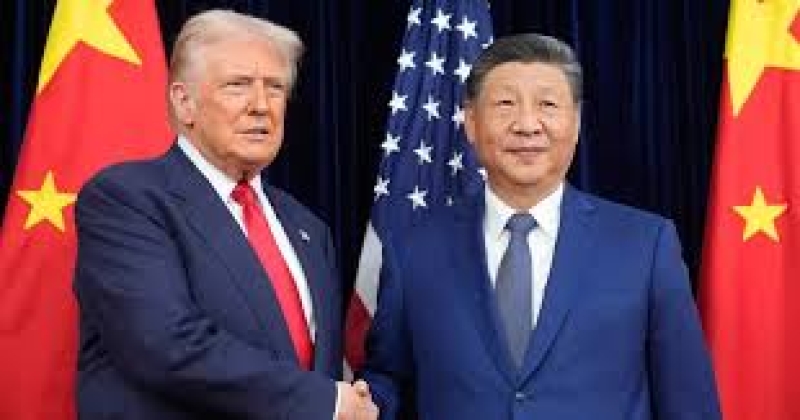- 2,582 candidates submit nomination papers for Bangladesh polls |
- Tarique Urges Collective Effort to Rebuild Bangladesh |
- US Pledges $2 Billion for UN Humanitarian Aid, Covers Bangladesh |
- Postal Ballots Sent to Over 376,000 Bangladeshi Voters Abroad |
- Arms smuggling attempts rise ahead of BD polls: Home Adviser |
Trump cuts China tariffs to 47% after successful meeting with Xi

President Donald Trump on Thursday hailed his meeting with Chinese President Xi Jinping in South Korea as a major success, announcing plans to cut tariffs on Chinese imports while Beijing agreed to resume soybean purchases and ease export restrictions on rare earth elements.
Speaking to reporters aboard Air Force One, Trump said the United States would lower tariffs imposed earlier this year on China—from 20% to 10%—for exporting chemicals used in fentanyl production. The change reduces the total tariff rate on Chinese goods from 57% to 47%.
“On a scale of 0 to 10, with 10 being the best, I’d say the meeting was a 12,” Trump said. He added that he plans to visit China in April, with Xi expected to visit Washington later. The two leaders also discussed the possible export of advanced computer chips, with U.S. firm Nvidia expected to begin talks with Chinese officials.
Trump said a trade deal with China could be signed “pretty soon,” noting there were “not too many major stumbling blocks.”
Tensions remain despite optimism
The 100-minute meeting in Busan, South Korea, was seen as an attempt to ease months of economic tensions between the world’s two largest economies. The U.S. and China have been competing for dominance in manufacturing and emerging technologies such as artificial intelligence, while also clashing over geopolitical issues, including Russia’s war in Ukraine.
Trump’s aggressive tariff policy during his second term and China’s retaliatory restrictions on rare earth exports added urgency to the talks. Both sides now appear eager to avoid further economic disruption.
Xi, reading from prepared remarks at the start of the meeting, said through a translator that it was “normal” for two major economies to have disagreements but emphasized a willingness to cooperate.
Finding common ground
The meeting was held at a small military facility near Busan’s international airport, ahead of the Asia-Pacific Economic Cooperation (APEC) summit set to begin Friday.
In the days before the meeting, U.S. officials hinted that Trump would not follow through on his recent threat to impose an additional 100% import tax on Chinese goods. Meanwhile, China signaled flexibility on rare earth export rules and pledged to resume buying American soybeans.
Earlier in the week, negotiators from both countries met in Kuala Lumpur and reached what Chinese trade envoy Li Chenggang called a “preliminary consensus.” U.S. Treasury Secretary Scott Bessent described it as “a very successful framework.”
The meeting has already boosted investor confidence, with U.S. stock markets rising on hopes of a trade breakthrough.
Pressure points persist
Despite signs of progress, experts warn the underlying rivalry between Washington and Beijing remains intact.
“The proposed deal fits the pattern we’ve seen all year—short-term stabilization dressed up as strategic progress,” said Craig Singleton, senior director of the China program at the Foundation for Defense of Democracies.
Trump’s pressure tactic has largely been tariffs, while Xi has wielded control over rare earth exports—a vital resource for global industries ranging from defense to electric vehicles.
Trump’s latest announcement effectively replaces his earlier plan to raise tariffs to 145%, which he dropped following market backlash. On Oct. 10, he had threatened a 100% import tax, but Thursday’s meeting instead led to a reduction to 47%, effective immediately.
Xi is expected to remain in South Korea to meet regional leaders during the APEC summit after Trump returns to Washington, reports UNB.
“Xi sees an opportunity to position China as a reliable partner and strengthen ties with nations frustrated by U.S. tariff policies,” said Jay Truesdale, CEO of TD International and a former U.S. State Department official.

